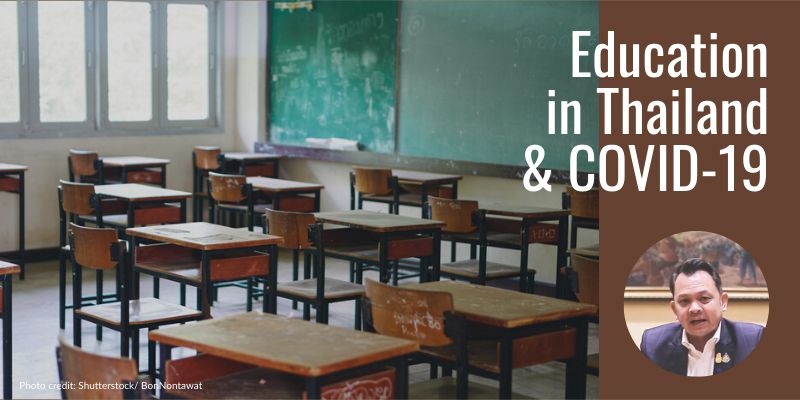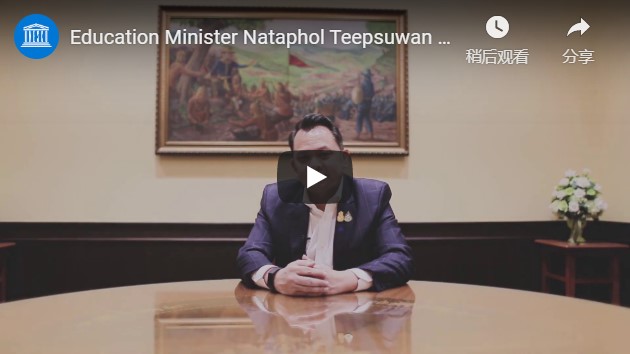UNESCO: Education Minister Nataphol Teepsuwan on COVID-19 strategy in Thailand
date:2020-04-21 15:13author:adminsource:UNESCOviews:


Education system gears up to continue quality learning
Providing education during the coronavirus disease (COVID-19) outbreak is a challenge for all countries, especially those wishing to improve equity and equality, such as Thailand. We have been preparing ourselves to bring about online learning platform solutions to help tackle this problem. Even though there will be a vaccine to cure this COVID-19 disease eventually, we must still be resilient, because the safety of children and youth is our highest priority in education management. Applying knowledge is the key to educational provision and we cannot let our students stop learning. Hence, we will ensure that our students will continue to access quality learning effectively and efficiently during the postponement of the school reopening.
MOE will apply Distance Learning Television model nationwide
We have to say that we have been arranging distance learning approach via satellite or DLTV (Distance Learning Television) since the reign of His Majesty King Bhumibol (King Rama IX), who had an excellent vision in bridging the knowledge gap for learners in rural areas. Today, Thailand has an opportunity to adopt this approach for underprivileged children and youth for all learners nationwide.
DLTV is our main solution during the COVID-19 crisis. We will combine existing recorded courses, which have been prepared in the past years, with newly recorded ones. We will build strong and relevant curricula for all learners in Thailand. Learners can access online platforms and the curricula will be classified into different parts.
New pedagogical approaches and parental role
Part I: For primary students (grade 1-6), the curricula will be different from that of older students. For this level, the pedagogical method will focus on one-way communication. In addition, there will be learning exercises and homework for learners to practice.
Part II: For secondary students (grade 7-12), it is necessary to ensure more interaction between students and teachers, hence we will focus on a two-way communication approach. Apart from the DLTV method, teachers are expected to be more active in providing support to learners via different online platforms. By doing so, teachers can respond to different needs of learners, provide them with feedback and generate an exchange of ideas. As mentioned earlier, we are preparing pedagogical methods that are age appropriate.
During the course of this pandemic period, parents or guardians will also have to adjust themselves and prepare to assume the role of teachers’ assistants to help their children learn. The social distancing measures require people to stay home. Therefore, parents or guardians can spare time to assist teachers to push forward the Ministry’s established mechanisms.
Crucial role for teachers to enhance their ICT skills
Teachers should also adapt their roles to respond to the needs of this online teaching platform. We realize that nowadays there are a certain number of teachers who are still unfamiliar with online teaching or do not have opportunities to use instructional technology and related devices. Today, the crisis has turned shortcomings into opportunities for all teachers in the country to adjust and fine tune their ICT skills and competencies for present and future use.
Please rest assured that teachers will have sufficient time to learn how to use technology to teach. We have postponed the start of school semester from 16 May to 1 July. During the school closure for 1.5 months, teachers have ample opportunities to enhance their ICT skills. They may need to rehearse before teaching on TV or computer screens to begin with. The adjustment may be a challenge, but I believe that all teachers have determination, passion and can adjust to the new way of teaching in a short period of time.
Turning crisis into opportunity
COVID-19 is granting us an opportunity to improve our education system. We can adjust ourselves in so many ways, one of which is to integrate ICT with teaching and learning. This will allow Thai learners to utilize digital technology to obtain relevant skills and competencies as required in this digital age. This is to prepare our youth for future development. Obviously, they will have to adjust and familiarize themselves with digital technology and related devices so as to develop their knowledge. It is indeed a great opportunity to use digital technology and online media to learn and take stock of our learner’s skills in learning online, taking examinations online, etc., in line with their age groups. Such information will help us to prepare each student based on his/her learning performance.
Exploring a suitable assessment system to monitor learning performance in crisis
A suitable assessment system will indicate and compare the differences of students’ learning performance. For instance, we can compare Thai and international students studying in Grade 7 on their knowledge and skills in several subjects, such as mathematics, and indicate the differences. We may find some grade 7 students with the same skill sets as grade 9 students. At the same time, some other grade 7 students may have the skill sets in mathematics similar to students studying in grade 5 or 6. For us, this is an opportunity to categorize learners with lower performance and provide specialized instructors to bring out their potential and help them to reach the benchmark set for their grades.
Regarding learning assessments, there should be a national system to measure the skills of both instructors and learners so that we can record their studies and work. For instructors, we can see how well they have prepared their lesson plans. For learners, they should be able to take tests any time and record all test results. It is also a good opportunity for the Ministry of Education to compile data to be used in planning, developing and assessing the online teaching system as a whole. By so doing, we expect that we will be able to help teachers and students better adjust to the new way of instruction.
New priorities, new focus on resource allocations
The Ministry of Education is fully aware of the adjustment with regard to the government’s budget allocations for the Ministry. If the COVID-19 pandemic continues to develop, the Ministry will have to adjust how we allocate our budget. In that case, the budget allocation will shift from schools to the development of curricula, online teaching and ICT devices to enhance the effectiveness of online learning. At present, the budget allocation for schools is not relevant because we still do not know when learners can return to schools.
The Ministry of Education of Thailand has prepared to tackle this unprecedented situation. We have taken stock of what other countries have been planning and doing in this matter. We noticed that schools and universities are likely to take longer to resume normality than other organizations. So far, there is no vaccine for the COVID-19 and no one knows when the pandemic will end. This is why the Ministry of Education of Thailand attaches great importance to online learning and its value to education in the very near future. We are ready and have planned to promote online learning to cope with all the necessary changes.

